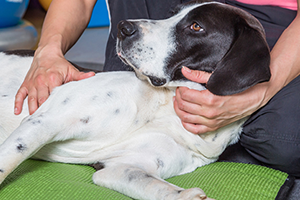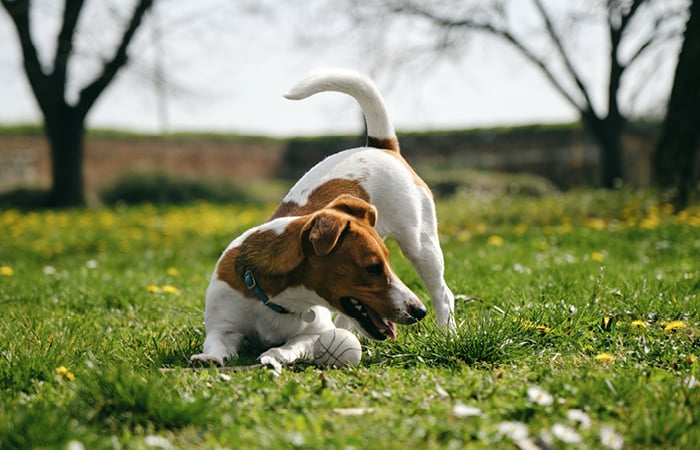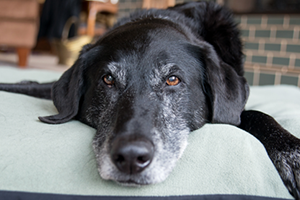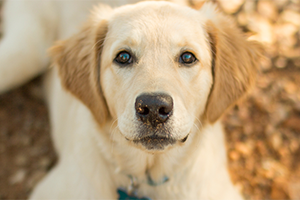
A high energy, fun-loving friend for the whole family
Vital stats
Size: Small
Coat: Medium, requires daily grooming
Exercise: At least 1 hour a day
Life span: 10+ years
Breed group: Gundog
Temperament: Playful, affectionate, intelligent
Swipe to view more
| Size: | Medium |
| Coat: | Long haired, requires daily grooming |
| Exercise | 1 hour a day |
| Life span: | 11+ years |
| Breed group: | Gundog |
| Temperament: | Playful, affectionate, intelligent |
Cocker Spaniel temperament & personality

- Cocker Spaniels are lively, friendly and adaptable, and can live happily in all types of households.
- Kind and gentle, Cocker Spaniels are a good choice for first-time dog owners.
- Cocker Spaniels are sociable and quickly form strong bonds with their families. Their outgoing personality means they enjoy being around people and other pets.
Cocker Spaniel training & exercise

How to train a cocker spaniel
- To make sure your dog is safe while off the lead, start recall training from a young age. Puppy training also helps socialise your Cocker Spaniel puppy and encourage good habits.
- Cocker Spaniels are always eager to please, and respond well to positive reinforcement.
Exercise
- For the first six months, Cocker Spaniel puppies should be exercised gently, for short periods. As they get older, you can add longer, more exciting walks into your daily routine. Start slowly and gradually introduce extra activity in small steps.
- Vets recommend that this breed needs an hour of exercise per day, but most Cocker Spaniels can keep going for much longer.
Keeping them happy
- Cocker Spaniels can be sensitive to loud noises and rough handling, but plenty of socialisation from a young age will help them cope with unexpected events such as busy environments or attention from young children.
- Cocker Spaniels are energetic, intelligent and inquisitive dogs who need plenty of playtime and mental stimulation to keep them entertained. A bored Cocker Spaniel may resort to unwanted or destructive behaviours including whining, scratching or chewing, as a way to release pent-up energy.
Game ideas
- The best games for these clever, inquisitive dogs involve plenty of mental stimulation. Cocker Spaniels love interactive games such as fetch and hide-and-seek, combined with plenty of walks.
- They love roaming free and exploring smells, but to keep your dog safe, only let them off the lead in a secure area.
Common Cocker Spaniel health conditions
Some health conditions affect English Cocker Spaniels more than other breeds. Tumours, skin conditions, ear conditions, eye disorders and injury are the top five most common claims that Petplan sees among Cocker Spaniels.
If you’re buying a Cocker Spaniel puppy, increase the chances of them being happy and healthy by choosing a reputable breeder.
Eye problems are common in all breeds of dogs, including:
- Dry eye: If a dog’s eyes don’t produce enough tears, the surface structure of the eye can become chronically inflamed.
- Corneal ulceration: This happens for a number of reasons, including scratches to the eye, foreign material, chemicals, heat, smoke or infection.
The treatment of eye disorders depends on the type and severity of the eye disorder. Corneal ulcers can be treated using eye drops and occasionally surgery. Sometimes, lifelong treatment is required to keep your dog’s vision in good health.
Dogs are susceptible to common ear issues, affecting different parts of the ear. The ear canal can become especially irritated by grass seed, parasites, allergies or infections. Irritation can lead to a condition called otitis, which simply means ’inflammation of the ear canal’. It causes an intense itch, leading the dog to shake its head, flap its ears and scratch them using its back paws. If the otitis is due to an allergy, treatment is required for the lifetime of the dog.
Cocker Spaniels are prone to a developmental bone disease within their elbows called incomplete ossification of the humeral condyles (IOHC). This can lead to lameness, cracks in the bone and even fractures of the elbow. Diagnosis requires CT scans, and treatment involves surgical stabilisation of the cracks or fractures.
English Cocker Spaniels are prone to a variety of lumps and bumps developing in the layers of fat, skin and muscle, including:
- Cysts
- Abscesses
- Lipomas
- Tumours, including mast cell tumours
Mast cells are normal skin cells that help dogs respond to trauma and damage by releasing histamine. However, these cells can sometimes replicate into a serious type of tumour called a mast cell tumour. These tumours vary widely in size and shape, but most take the form of a solitary lump within the skin. Treatment depends on the size and location of the tumour, but almost always involves surgical removal.

Cocker Spaniel grooming

Cocker Spaniels have a flat, silky coat that comes in a range of colours, including chocolate, tan, black and white. Their medium-length coat needs regular grooming.
- Gently brushing your dog each day can help form positive associations when being groomed, keep their coat clean and shiny, prevent matting and ensure they’re happy being handled by professional groomers.
- Cocker Spaniels are prone to ear infections, as their long, heavy ears can prevent air from properly circulating the ear canal. Use your grooming sessions to check your dog’s ears for signs of infection, such as a strange smell or black or brown wax. At the same time, check their body for any lumps or signs of parasites.
- As gundogs, Cocker Spaniels are naturally drawn to water – and with water comes mud! Bathe your dog as often as necessary, using an appropriate dog shampoo to help limit skin allergies.
- It’s also important to regularly brush your dog’s teeth, as this can help to prevent plaque and tartar from building up, and will keep their gums healthy.
Cocker Spaniel nutrition

With a real love for food and a tendency to form a close bond with the person who feeds them, it’s a good idea to keep an eye on your Cocker Spaniel’s weight. Vets recommend a nutritious, high-quality pet food diet.
- Stick to the food packaging guidelines when weighing out your dog’s food, but bear in mind their age, size and activity level when determining portion sizes.
- If you have a working Cocker Spaniel, ask your vet about an appropriate high-protein diet to ensure they’re getting all the nutrients and energy they need.
Getting a Cocker Spaniel

If you’re ready to add a Cocker Spaniel to your family, it’s time to decide whether to adopt your new dog from a rehoming centre or find a reputable breeder. Here’s what you need to know about both options:
Rehoming centres
- Adopting a rescue dog can be an extremely rewarding experience, and there are plenty of rehoming centres across the UK. A good place to start is by contacting local centres and asking if they have any Cocker Spaniels available for adoption.
- Petplan also works with rehoming centres across the UK, including Battersea Dogs & Cats Home, Blue Cross and Dogs Trust.
- Rehoming a dog is a big decision, so make sure you’ve done your research and are fully prepared to support your new dog’s needs. If you’re a first-time dog owner, adopting a young adult dog, between two and five years old, is a good choice. They’ll be through the puppy stages, but still young enough to fit into your family.
- If you’d like to buy a puppy, the first thing to do is identify local responsible breeders. Dog breeders in the UK must have a licence if they’re selling more than three litters per year. Breeders should also be happy for you to meet both parent dogs and answer any questions about health checks and licences.
- When visiting puppies, the mother should always be present. Observe how she interacts with you and the breeder, and ask questions about her temperament and health. Puppies should never go to their new homes before they’re eight weeks old.
- Breeders who work with Petplan will also get four weeks of free dog insurance, which you can then extend.
Cocker Spaniel frequently asked questions
Discover some of the most popular dog breeds
Cocker Spaniel insurance considerations
Choosing the right insurance for your Cocker Spaniel can help keep them happy and healthy should they develop any problems. As some conditions can be lifelong, it’s important to consider the length of time policies cover different conditions when choosing dog insurance. Petplan’s Covered For Life® policies allows you to claim for the same condition year after year, so long as you renew your policy, allowing your pet to receive the best care for ongoing conditions.
We always offer these things as standard:
Physiotherapy & pet therapies
Along with physiotherapy, which is covered within the Vet Bills benefit, we also cover Pet Therapies like herbal medicine, homeopathy and acupuncture. You can also claim for hydrotherapy, up to £500 per illness/injury in dogs and cats (no additional limit for rabbits).
Petplan is a trading name of Pet Plan Limited (Registered in England No. 1282939) and Allianz Insurance plc (Registered in England No. 84638), Registered office: 57 Ladymead, Guildford, Surrey GU1 1DB.
Pet Plan Limited is authorised and regulated by the Financial Conduct Authority. Financial Services Register No. 311969. Allianz Insurance plc is authorised by the Prudential Regulation Authority and regulated by the Financial Conduct Authority and the Prudential Regulation Authority. Financial Services Register No. 121849. Pet Plan Limited is a subsidiary of Allianz Insurance plc.



















































